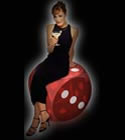Keeping Track of the Cards
1. Do you need to keep track of the cards ?
Ans : Yes, especially the low cards.
2. Why ?
Ans : Many situations will develop where you need one or two cards to make your hand, or you will need to know how live certain cards are to determine whether it is likely that an opponent will have a particular reading hands.
3. Example ?
Ans : Suppose you have a six-high straight and are worried that an opponent might have a split with you or a wheel. Remembering the cards will have a large effect on whether you should jam or not.
4. What about the scare cards you don’t see ?
Ans : You can deduce a great deal about them.
5. Example ?
Ans : Suppose that someone starts with a low card up, meaning that he probably is going low. If he folds after catching another low card, such as a deuce which might have given him four good card distribution you can conclude that two deuces are gone.
Introduction / Starting hands / Three of a Kind Wired / Disguising Your Hand / Ante Stealing / Getting Reraised on a Semi-Steal / When an Ace Raises / When the Bring-In Raises / General Strategy / How Far Do You Go? / Fourth Street / Check-Raising on Fourth and Fifth Streets / Fifth Street / Sixth Street / Seventh Street / Position / Playing the High Hands / Bluffing / Slow-Playing / Knowing Your Opponents / Raising Aggressively / The Toughest Decision of All / Staying to the End / Pairing the Door Card / Keeping Track of the Cards / Scare Cards / An Expert Play / Another Good Play / Reading Hands / Psychology / Afterthought


